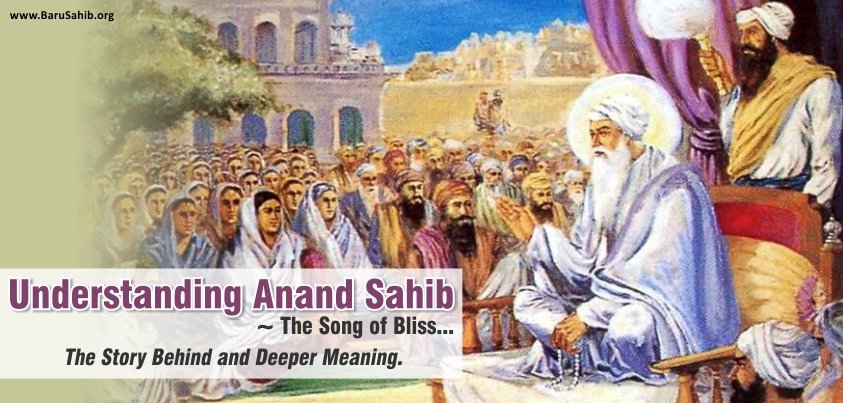There is a great story about how the Anand Sahib, by Guru Amar Das ji, came to be written. It is said that, during Guru Amar Das ji’s time, there was a very old yogi who had spent years and years in isolation and deep meditation. But as the yogi was coming to the end […]
There is a great story about how the Anand Sahib, by Guru Amar Das ji, came to be written. It is said that, during Guru Amar Das ji’s time, there was a very old yogi who had spent years and years in isolation and deep meditation. But as the yogi was coming to the end of his life, he realized that he was missing something. That he still hadn’t “got it.”
The old yogi had heard of a very old wise man, who was deeply respected and honored. This wise man was Guru Amar Das ji, the third Guru of the Sikhs. The yogi decided to visit Guru Amar Das ji and see if the Guru could solve his dilemma.
In audience with Guru Amar Das ji, and after paying the proper respects, the yogi described his frustration with his practice and then asked very simply, “Oh kind and wise Guru, will you teach me how to just live life?”
Guru Amar Das nodded. “Leave this body,” he told the yogi. “And be reborn in my family. Then come to me and I will teach you how to live.”
The yogi took his leave of the Guru. Soon after, in obedience to the Guru’s command, the yogi sat in meditation and left his body. In due time, the wife of Guru Amar Das ji’s son Mohri gave birth to a grandson. When Guru Amar Das heard of the birth of the child, he knew that the yogi’s soul had been reborn. Immediately, he called for the child to be brought to him even though the traditional time of sequestering the infant with the mother had not yet passed.
As soon as his grandson was in his presence, Guru Amar Das ji sang the Anand Sahib – the Song of Bliss. When he was done singing, the Guru named the child Anand.
What, then, is the Anand Sahib? How did Guru Amar Das ji respond to the yogi’s prayer to understand how to live life? There is an old tradition that says that each pauree, or step, of the Anand Sahib gives the essential lesson to the soul for that particular year of life. So the first Pauree, or verse, relates to the child’s first year of life. The 2nd pauree or verse is for the 2nd year of life. And so on.
Step by step, year by year, all the way until the 40th year. If the lessons are learned year after year, then a person can develop his or her personality in a very spiritual and conscious way. The mind becomes thoroughly trained to support the soul’s reality in the midst of daily life.
But if some step is missed along the way, that person still has the rest of his or her life to meditate upon the Anand Sahib and to learn it.
In the weeks and months ahead, my prayer is to write a series of columns that highlight each Pauree of the Anand Sahib and how it relates to the soul’s lesson for that particular year of life. My hope is that this series will be of interest and spark some good dialogue among all of those who read it.
Back before British rule in India, the entire Anand Sahib, from the 1st through the 40th Paurees, were read before the hukam was taken. It is said that the Anand Sahib in its completeness gave the Sikhs their unique power and strength.
By looking at this Bani, verse by verse, we can perhaps rediscover what the Sikhs of old once knew.
Please leave a comment and let me know if this sounds interesting to you.
With Divine Light,
Ek Ong Kaar Kaur
~ Source: http://www.sikhnet.com/
Main Source of this Sakhi: Mehma Parkash Granth by Sroop Dass Bhalla


Waheguru hi did this get produced in the end ? If so where can I find? Thanks